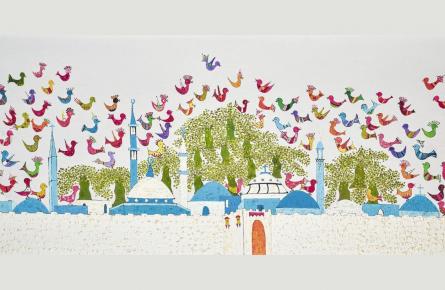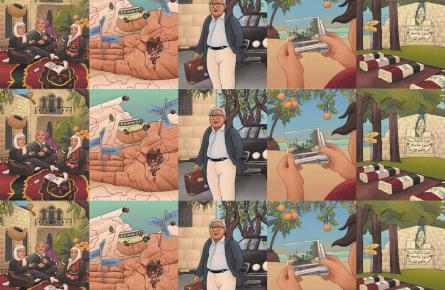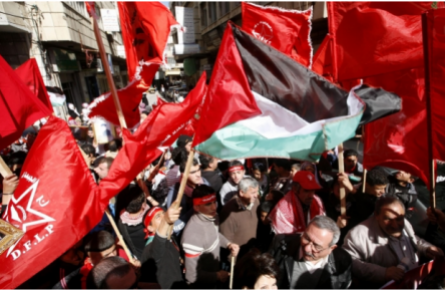What a harsh life that Suha Ghassan Jarrar lived, the daughter of the captive Khalida Jarrar and the liberated captive Ghassan Jarrar, who was arrested and liberated more than once. When Suha was born in 1990, her father, Ghassan, was imprisoned, and this was not the first time. His journey began with the arrest in 1976, with him being subject to brutal torture in the basements of the Israeli intelligence service (Shin Bet). When Suha left this world, her mother, Khaleda, was under arrest, and between birth and departure, the parents were under repeated arrests and military trials, and many of the cold Ramallah nights were as heavy as hammering on steel while searching for the father or the mother.
What a cruel life in which you open your eyes in the forced absence of a father and close them in the forced absence of a mother. These words are for the captive Khalida Jarrar after learning of the news of the death of her daughter Suha, thirty-one years old, following a severe heart attack in her home in Ramallah. On the day of the funeral, Khaleda sent a message in which she wrote: They forbade me (meaning the Israeli government) from saying goodbye to you with a kiss. I bid you farewell with a rose.
The late Suha was a human rights and environmental activist who was always concerned with preserving the values of justice and human rights. With her death, they vandalized both her most basic rights and that of her mother.
Talking about the arrest of a father, mother, brothers, sisters, or father and mother together is a common occurrence in the Palestinian case since 1967. Over 800,000 Palestinians have experienced arrest, and among them are those who have spent over four decades behind bars (the captive Nael Al- Barghouti). Some are first-class Palestinian leaders, women, children, sick and elderly.
With the Jarrar family, the matter is different. The Israeli military courts sentenced Khaleda, a Palestinian parliamentarian, to two years in prison on political charges that have no security value. At first, aiming for revenge, and second, intending to keep her far from the Palestinian arena. Upon Suha’s death, Khaleda had nothing but three months or fewer, and therefore the Israeli government could have released her as a “goodwill gesture” and get satisfaction with the time she spent behind bars, or conditionally released her for several hours to take part in her daughter’s funeral and then return to prison to complete her sentence, but these two requests were rejected. Many fathers and siblings have lost a loved one during their detention, but Khaleda may be the only mother who lost her daughter while in detention. Because of the particularity of this case, a committee of Palestinian lawyers and Palestinian and international human rights institutions launched an international campaign aimed at releasing Khalida Jarrar to take part in her daughter’s funeral, but the Israeli government rejected all the proposals made by lawyers in this regard, and did not accept any settlement that serves this goal (release or conditional release), and refused to submit to pressures from European parliamentarians and Arab representatives in the Israeli Knesset.
Most surprisingly, the Israelis refused a settlement whereby they would not release Khaleda, but only transfer her from Damon Prison in the high Mount Carmel in Haifa to Other Prison near Ramallah to receive the last glimpse of her young daughter Suha after bringing her dead body to this prison. This proposal was also rejected, and to facilitate the matter, the committee submitted another proposal to move the body to the Al-Jalamah military checkpoint separating the city of Jenin in the northern West Bank and the Palestinian interior towards the Marj Bin Amer Plain, and transfer Khaleda from Damon Prison to this checkpoint, which is only 40 minutes away from her prison. This proposal was also rejected.
Since the first day of the occupation, the Israeli authorities have not compromised on issues of detention, nor have they negotiated or made goodwill initiatives, or made any humanitarian gesture in this regard. This issue is not only related to the policy of the prison police and its administration, which implements the Shin Bet’s policies and the government’s policy and vision, which includes non-negotiation or bargaining in “security” matters, so to speak, but reflects the colonial mentality and the essence of the Zionist idea behind this intransigence and brutality all together and show excess strength in the enemy's face.
Khalida Jarrar’s case was not the first of its kind in this context. There are dozens of similar cases of prisoners who were unable to take part in the funerals of their relatives or to have a last look, including Sheikh Bassam Hammad from the village of Silwad near Ramallah. It was Sheikh Hammad who volunteered for the mourning crowd at the funeral of Suha, the daughter of Khaleda and Ghassan. His sermon was not religious, as is customary in cases of burial of the dead, but about his personal experience, which largely resembles the experience of Khaleda and Ghassan. On December 4, 2015, his son Anas was martyred and his body was detained by the occupation authorities, and after ten days of martyrdom and detention of the body, the father, Bassam Hammad, was administratively detained for four months, which was extended to another six months, and after a month of arrest, the occupation authorities announced their intention to hand over the body of the martyr Anas to his family, and that the handover will take place at the entrance to Ofer Prison near Ramallah, which is the same prison where Sheikh Bassam, Anas’ father, is being held. This prompted the representatives of the Palestinian factions in Ofer Prison to demand that the prison administration allow Bassam to take a farewell look at his martyred son, especially since the body will be delivered at the entrance to the prison, and it was surprising and reprehensible that the prison administration agreed to the request of the detainees’ representatives, and the father and his fellow prisoners began to prepare psychologically for this harsh moment (what will he say to him? How will he say goodbye? What will he wear? And many more questions, not to mention the tension and the time that He paused, waiting for this moment, and the imaginary images in the grieving father’s mind.) But their astonishment and disapproval soon dissipated. At the last moment, the prison administration informed them that the Israeli intelligence service refused to allow the detained father to bid farewell to his son at the entrance to the prison under heavy guard. Of course, the announced and ready-made reasons that are usually used on all occasions are security reasons.
Bassam Hammad’s story did not end with his being denied farewell to his martyred son. Rather, it went beyond that to his re-arrest after his release for nearly two years, and the arrest of his son Abdul Rahim, and the legs injury of his daughter, Taqwa, and her arrest as well, and his story has a sequel.
Forbidding the father of imprinting a kiss on the forehead of his martyred son, which is neither difficult nor impossible, but brings us back to the colonial nature of the Israeli occupation; The issue here is not a question of goodwill initiatives or human gestures, but a question of arrogant occupation that does not give weight to its moral image, and does not care to hide its ugly image, but on the contrary, it highlights it sometimes and justifies it at other times to show through it its strength and arrogance, which form the core of his colonial consciousness and the source of his pride.
Bassam and Khaleda... The list is long of grieving fathers who did not beg the occupier to place kisses on the forehead of their deceased sons. And every time this occupier insists on appearing in his hideous appearance that ignores the simplest moral and human values and the values of justice.
-




